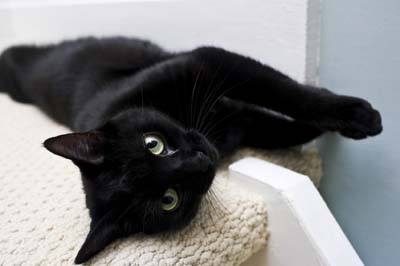
Every October, shelters and rescues are mired in controversy over black cats. Some shelters are criticized for offering special adoption fees for black cats during the spooky season, while others are criticized for suspending adoptions amid rumors of people adopting them for party decorations or dark rituals.
While there is no actual evidence that black cats are in danger of abuse specifically related to Halloween, these poor kitties just can’t seem to catch a break from myths and superstitions!
Just for fun, here are a few beliefs about these felines that have come and gone throughout history.
They’re bad luck:
- In Medieval France and Spain, black cats have long been associated with bad omens, bad luck, curses, and witchcraft.
- Meanwhile, around the same time period in Germany, it was considered a bad omen if a black cat crossed your path from right to left (but a good one if it crossed from left to right).
- The Puritan Pilgrims in the US associated them with witchcraft, and some actually believed witches could turn into black cats.
- Once upon a time in Ireland, a black cat crossing your path by moonlight mean you were sure to die in an epidemic.
They’re good luck:
- In the British Isles, black cats were believed to bring wealth to any house they occupied.
- British fishermen considering a ship’s cat wanted a black one for the good fortune they brought, and their wives kept black cats in the house to make sure their husbands came home safely.
- 17th century British monarch Charles I believed his luck was gone when his treasured black cat died, and he may have been right – the very next day he was charged with high treason.
- In Scotland, a strange black cat’s arrival to the home meant prosperity.
- In the English midlands, black cats were highly desired wedding presents since they meant good luck to brides; in other places it is said that a happy marriage could be predicted by a black cat sneezing on the wedding day.
- In Southern France, black cats brought luck to owners who fed them well and treated them with respect.
- In Japan black cats were good luck, and single women with black cats were said to attract many suitors.
- It is widely known that cats were worshipped in Ancient Egypt, but black cats held a special honor; Bastet was the goddess of cats, protection, joy, dance, music, and love during Twenty-Second Dynasty – and she took the form of a woman with the head of a black cat.
Thanks to the symbolism associated with black cats throughout history – and now, particularly at Halloween – some people still have superstitions about them. In fact, there is some data to suggest that black cats wait longer to be adopted from shelters than any other color. But you can relax, since black cats are just like any other cats. Besides, they don’t care what color your hair is!
Happy Halloween!
